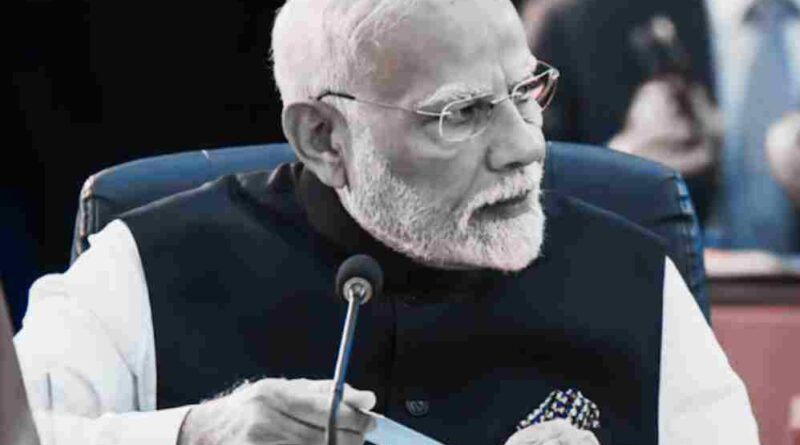PM Modi’s Firm Stand at BRICS Summit: “Nations Fueling Terror Will Be Held Accountable”
In a powerful and emotionally charged address that echoed far beyond the scenic valleys of Pahalgam, Prime Minister Narendra Modi delivered a clear and unwavering message to the world: nations that support, sponsor, or turn a blind eye to terrorism must face consequences.
Speaking during his virtual participation in the BRICS Summit—a key gathering of Brazil, Russia, India, China, and South Africa—PM Modi didn’t mince words. His tone was assertive, his message resolute, and his intent crystal clear. From the highlands of Jammu and Kashmir, he spotlighted not only the wounds inflicted by terror but also India’s commitment to peace and global security.
A Message Born from Pain and Resilience
There was symbolic weight in the setting. Pahalgam, nestled in Kashmir’s serenity, has long stood as a witness to both natural beauty and the scars of conflict. Modi’s choice to speak from there wasn’t coincidental—it was a quiet but powerful reminder of the resilience of regions like Kashmir, which have endured the brunt of cross-border terrorism.
Without directly naming any nation, Modi’s remarks carried unmistakable undertones. His words reflected the long-standing frustration India has voiced on global platforms—particularly about countries that have, directly or indirectly, enabled extremist violence through funding, training, or ideological backing.
Terrorism Has No Borders—And No Excuse
“Terrorism in any form, in any part of the world, is a crime against humanity,” Modi stated, adding that such acts can never be justified under the garb of political or ideological reasoning. He urged the international community to adopt a “zero-tolerance” stance—one that doesn’t waver based on diplomatic interests or selective outrage.
More significantly, he emphasized that global powers must stop differentiating between “good” and “bad” terrorists, a practice that he argued only emboldens extremists and allows safe havens to flourish.
Global Unity Against a Global Threat
Modi used the BRICS platform to call for a united front. He urged the member countries to deepen cooperation not just in economic matters, but also in securing peace and countering the forces of destabilization. “Our silence or inaction empowers those who carry out and orchestrate these acts,” he said, stressing the moral responsibility of all nations to act.
In recent years, India has consistently pushed for global action against states that use terrorism as a strategic tool. From diplomatic efforts at the United Nations to bilateral engagements with Western allies, India has tried to build a consensus around isolating those who support extremist violence. Modi’s message in Pahalgam added a raw, emotional charge to that campaign.
A Shift in Tone: From Appeasement to Accountability
The Prime Minister’s speech also hinted at a larger shift in global diplomacy. For decades, geopolitical interests often led to compromised stances on terrorism—either through inaction or muted condemnation. Modi’s call for accountability marked a hardening of tone, reflecting a growing impatience within nations affected by terrorism.
He reiterated that “the cost of encouraging or tolerating terror must outweigh the perceived benefits,” suggesting that sanctions, international isolation, and diplomatic pushback are tools that should be used more decisively.
India’s Dual Role: Victim and Vanguard
India’s position as both a victim of terror and a rising power lends its voice credibility and urgency. PM Modi’s remarks showcased India not just as a country seeking justice, but as a global player willing to lead from the front. The fact that this message came while India hosted the BRICS Chair this year added strategic weight to it.
A Global Echo
Though no specific country was named, Modi’s message sparked ripples across international diplomatic circles. Analysts noted that the statement was not just a warning—it was a signal of India’s growing willingness to push harder on the global stage to isolate rogue actors.
Many BRICS members have themselves dealt with terror threats, albeit in different forms. Modi’s call for unity on this front was a strategic reminder: if peace is a shared goal, then the fight against terror must be a shared responsibility.
Moving Forward: From Words to Action
While speeches carry weight, actions define legacy. Modi’s strong words in Pahalgam now place a moral imperative on global leaders to translate shared outrage into sustained strategy. Whether it’s through financial crackdowns, tighter border controls, intelligence sharing, or naming and shaming complicit regimes—global cooperation is no longer a diplomatic choice. It’s a survival necessity.
India’s message is loud, clear, and firm: terrorism has no place in a civilized world, and those who feed its flames must be prepared to face the heat.
Disclaimer
The information and content shared on digitalgithub.com — including articles, blogs, news, guides, and other resources — is intended for general informational and educational purposes only. We do not guarantee the completeness, reliability, or suitability of any information. Always seek the guidance of a qualified professional before making decisions based on the information you read. Use this site at your own risk.

